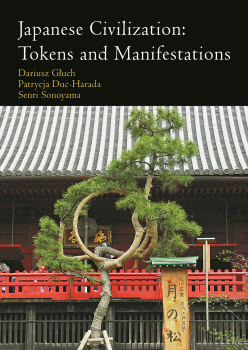Japanese Civilization: Tokens and Manifestations
Keywords:
Japanese civilisation, Japanese culture, cultural studiesSynopsis
The articles collected in this publication are thematically diversified and refer to such domains of Japanese studies as literary studies, cultural studies, linguistics, history of art, theatre, sociology and anthropology.
Some of the papers deserve attention as original reinterpretations of traditional sources and texts of the Japanese culture, also in reference to the ethnic, geographic and cultural peripheries. Among other matters undertaken in this publication, the problem of national awareness, axiological approach to the Japanese sphere, its various evidences and manifestations, as well as its confrontational understanding with regard to the opposition between self and other, we and they, we and others in the historical context should be noted.
The linguistic problems presented here are tightly bound with domains of traditional values as language etiquette, contacts between the Japanese language and Classical Chinese, or traditional language games.
It should be stressed also that the papers are still up-to-date, represent high scientific quality, and undoubtedly should be available for every interested reader. The issues touched upon in the collection are rarely present in scholarly debate, and for this reason may be of interest to those who want to deepen their knowledge of Japanese culture and civilization.
Chapters
-
TABLE OF CONTENTS
-
Foreword from the editors
-
序
-
Changes and Modifications Occurring in the Category of Japanese Politeness
-
Kanbun-kundoku – Translation Procedure of Classical Chinese Text in Contemporary Japanese
-
Two-dimensional Public Space: The Kabuki Play "Kanadehon Chūshingura" Transposed into 19th-century Woodblock Prints
-
“Nihon, mon amour”: Japan’s Paris and the Crossroads of History
-
Music and Dance Performances at Funeral Rites as a Political Mechanism in the Ancient Japanese Court
-
Aisukuriimuga suki! Some Remarks on the Japanese Noun+Adjective Sentence Patterns
-
花宴の巻にみる桐壺帝皇権の風景
-
近代日本による沖縄と台湾への「旧慣」調査の比較 ―田代安定の調査を中心に―
-
Depicting Madness, Poeticising Love – Takamura Kōtarō’s Chieko shō
-
『枕草子』の「打聞」考
-
The Source of Identity in Contemporary Japan. The Anthropological Approach
-
専修大学図書館所蔵『源氏物語画帖』考
-
日本における自他の文化認識―古代から現代まで
-
Motifs of Nomadism and Social Exclusion in Abe Kōbō’s Works Based on the Short Story – The Dream Soldier (Yume no heishi 夢の兵士)
-
Shitagō’s "Ametsuchi" Text as a kana Letter-wheel
-
「近世身分制社会における 忠と孝―近世武士像創出の一面―」
-
The Art of Necrophilia: Analogies between the Composition of Mishima Yukio’s Novel "The Sea of Fertility" and the Composition of the Japanese Classical Nō Drama
-
How to Walk the Dewy Path. Roji (a Dewy Path?) as Seen in Nanbō Sōkei’s "Nanpōroku"
-
Mapping Japanese Young People’s Beliefs about Their Emotional Display in Interaction with Friends and Acquaintances





